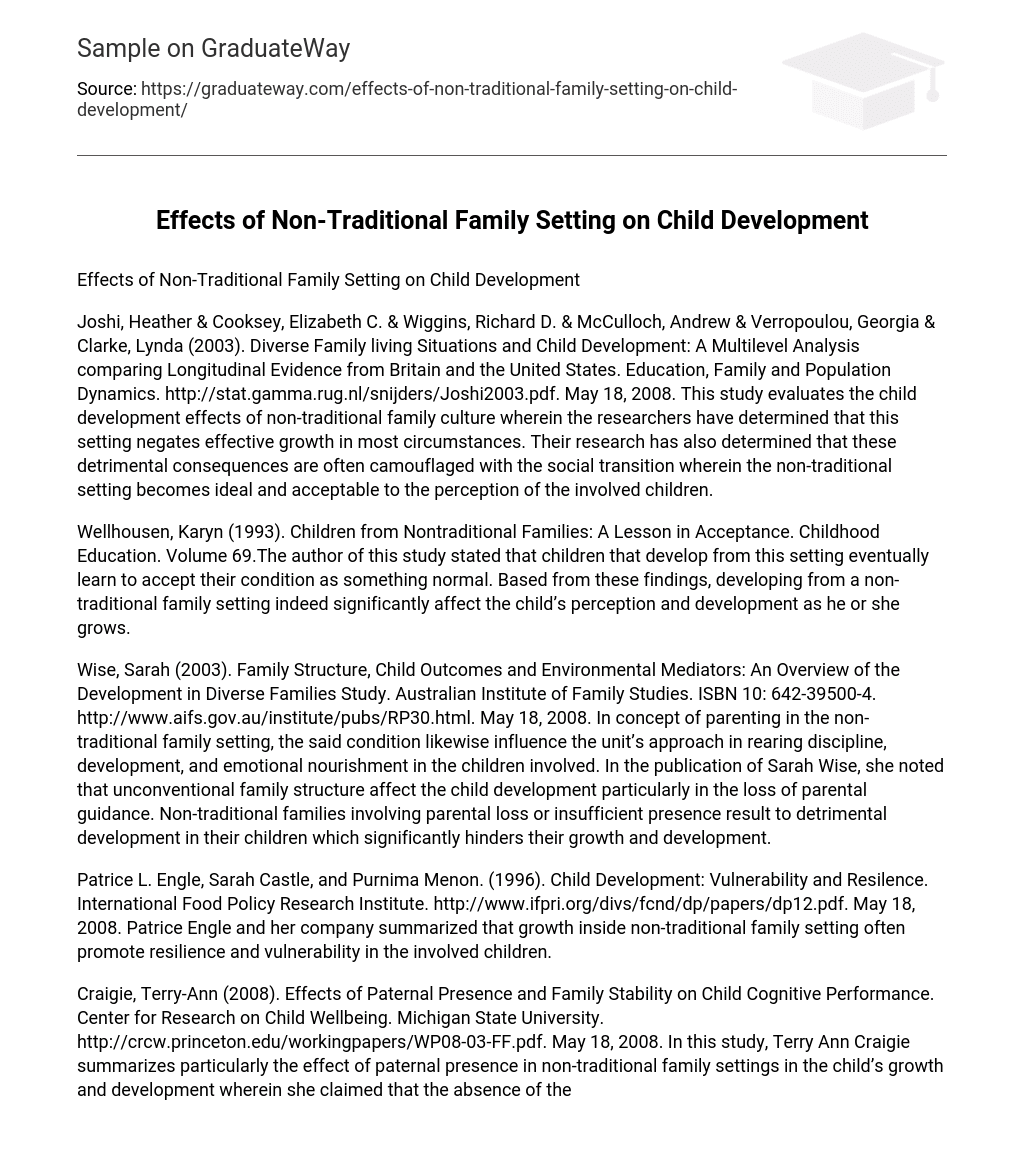Joshi, Heather & Cooksey, Elizabeth C. & Wiggins, Richard D. & McCulloch, Andrew & Verropoulou, Georgia & Clarke, Lynda (2003). Diverse Family living Situations and Child Development: A Multilevel Analysis comparing Longitudinal Evidence from Britain and the United States. Education, Family and Population Dynamics. http://stat.gamma.rug.nl/snijders/Joshi2003.pdf. May 18, 2008. This study evaluates the child development effects of non-traditional family culture wherein the researchers have determined that this setting negates effective growth in most circumstances. Their research has also determined that these detrimental consequences are often camouflaged with the social transition wherein the non-traditional setting becomes ideal and acceptable to the perception of the involved children.
Wellhousen, Karyn (1993). Children from Nontraditional Families: A Lesson in Acceptance. Childhood Education. Volume 69.The author of this study stated that children that develop from this setting eventually learn to accept their condition as something normal. Based from these findings, developing from a non-traditional family setting indeed significantly affect the child’s perception and development as he or she grows.
Wise, Sarah (2003). Family Structure, Child Outcomes and Environmental Mediators: An Overview of the Development in Diverse Families Study. Australian Institute of Family Studies. ISBN 10: 642-39500-4. http://www.aifs.gov.au/institute/pubs/RP30.html. May 18, 2008. In concept of parenting in the non-traditional family setting, the said condition likewise influence the unit’s approach in rearing discipline, development, and emotional nourishment in the children involved. In the publication of Sarah Wise, she noted that unconventional family structure affect the child development particularly in the loss of parental guidance. Non-traditional families involving parental loss or insufficient presence result to detrimental development in their children which significantly hinders their growth and development.
Patrice L. Engle, Sarah Castle, and Purnima Menon. (1996). Child Development: Vulnerability and Resilence. International Food Policy Research Institute. http://www.ifpri.org/divs/fcnd/dp/papers/dp12.pdf. May 18, 2008. Patrice Engle and her company summarized that growth inside non-traditional family setting often promote resilience and vulnerability in the involved children.
Craigie, Terry-Ann (2008). Effects of Paternal Presence and Family Stability on Child Cognitive Performance. Center for Research on Child Wellbeing. Michigan State University. http://crcw.princeton.edu/workingpapers/WP08-03-FF.pdf. May 18, 2008. In this study, Terry Ann Craigie summarizes particularly the effect of paternal presence in non-traditional family settings in the child’s growth and development wherein she claimed that the absence of the father in circumstances of single-parenting or divorce affect the cognitive-development of the children inside the said unit. In addition, the absence of the paternal figure in the family unit detrimentally affect the child’s development and the stability of the family unit in economic and social terms.
Tasker, Fiona (2000). Parenting and Child Development in Nontraditional Families. John Wiley & Sons, Ltd. Volume 9, Issue 1, Pages 63-64. The author strongly claim that the non-traditional family setting is often characterized by its inconsistencies against the ideal family structure wherein it often fail to commensurate to the significant needs of the involved children particularly in the parental concern and standard.
University of New Hampshire Cooperative Extension (2008). The Effects of Divorce on Children. http://extension.unh.edu/family/documents/divorce.pdf. May 18, 2008. In the concept of parental absence in non-traditional family settings, this circumstance is often effected by numerous reasons of which the factors of parental divorce and absence due to legal incarceration often result to adverse consequences on the child’s growth. In the study of the University of New Hampshire, the said institution outlined that parental divorce is indeed detrimental to the child’s growth due to the social, emotional, and psychological problem that the setting impose on the child. These effects often burdened the child hindering his or her effective growth and his or her capabilities to cope with changes involving the same concern.
Charlesworth, Rosalind (2003). Understanding Child Development. CENGAGE Delmar Learning. 6th Edition. ISBN-10: 1401805027. The author strongly emphasized the need of parents in the family unit thus, a loss of one of the inefficiency of the couple can cause detrimental problems on the child’s development leading to personality and behavioral problems that are commonly embedded on the individual.





